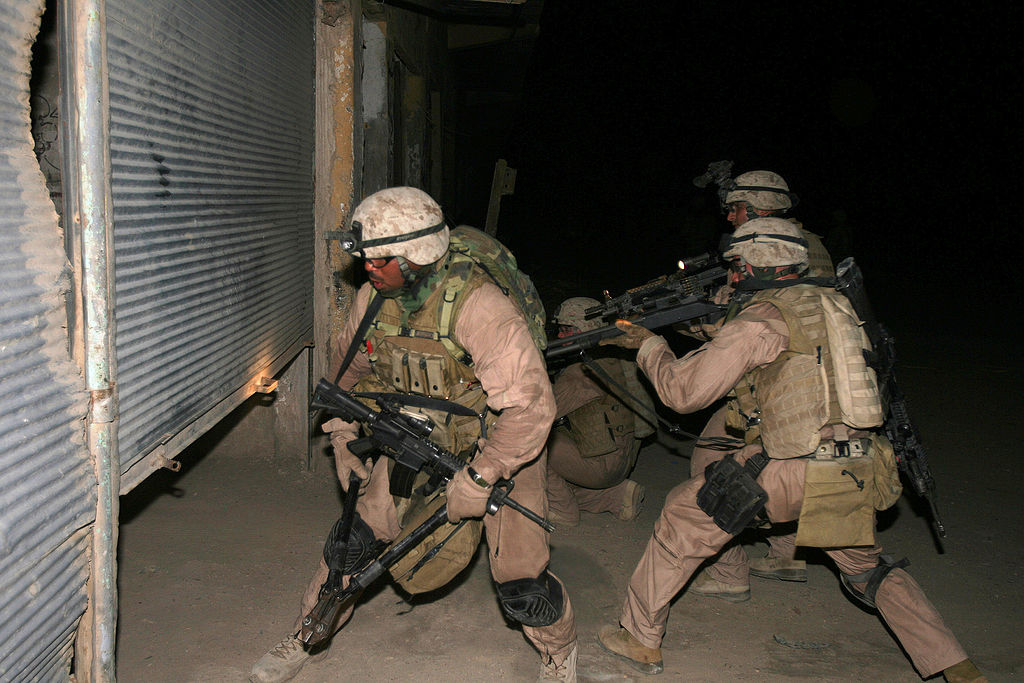Military Milestones from the King of Battle to Second Fallujah
This Week in American Military History:
Nov. 16, 1778: In a letter to Frenchman Jacques Donatien Le Ray de Chaumont, an intermediary between King Louis XVI and American emissaries seeking support for the American Revolution (including ships), Continental Navy Capt. John Paul Jones writes, “I wish to have no connection with any ship that does not sail fast, for I intend to go in harm’s way.”
Readers will recall Jones’ dramatic refusal-to-surrender — “I have not yet begun to fight!” — the following year during the famous battle of the North Sea between the Continental Navy frigate Bonhomme Richard and the British frigate HMS Serapis.
Nov. 16, 2004: (Featured image) Nine days after launching Operation Phantom Fury — the Second Battle of Fallujah — U.S. Marines and soldiers (as well as a few British and Iraqi troops) begin the mopping-up phase of what has since been described as the most intense urban combat since the bloody battle for the Vietnamese city of Hué in 1968.
It is during the height of the battle for Fallujah, that a radio transmission is intercepted by U.S. forces in which a panicking al-Qaeda insurgent is heard exclaiming to his chief: “We are fighting, but the Marines keep coming! We are shooting, but the Marines won’t stop!”
Nov. 17, 1775: The Continental Congress unanimously elects Henry Knox “Colonel of the Regiment of Artillery,” thus the official birth of the U.S. Field Artillery, known affectionately as the “King of Battle.” Infantry, by the way, is known as the “Queen of Battle.”
Knox’s regiment will become operational on Jan. 1, 1776. Knox (Yes, Fort Knox is named in his honor) is destined to become a major general and America’s first Secretary of War.
According to the U.S. Army’s Institute of Heraldry, “Although [today] Field Artillery and Air Defense Artillery are separate branches, both inherit the traditions of the Artillery branch,” and so both trace their ancestry to Knox and his regiment.
Nov. 18, 1967: U.S. Army Private First Class (future Sgt.) Sammy L. Davis, badly wounded, and with his artillery battery about to be overrun by an overwhelming force of Viet Cong diehards; mans a machinegun and singlehandedly mans two different howitzers, blasting away at the enemy and beating back the attack near Cai Lay, South Vietnam.
During the all-night battle, Davis — despite his wounds — also manages to swim across a nearby river to rescue three wounded buddies.
For his actions, Davis will be awarded the Medal of Honor.
Nov. 19, 1863: Pres. Abraham Lincoln delivers his now-famous Gettysburg Address, a portion of which reads:
“…we can not dedicate — we can not consecrate — we can not hallow — this ground. The brave men, living and dead, who struggled here, have consecrated it, far above our poor power to add or detract. The world will little note, nor long remember what we say here, but it can never forget what they did here. … we here highly resolve that these dead shall not have died in vain — that this nation, under God, shall have a new birth of freedom — and that government of the people, by the people, for the people, shall not perish from the earth.”
